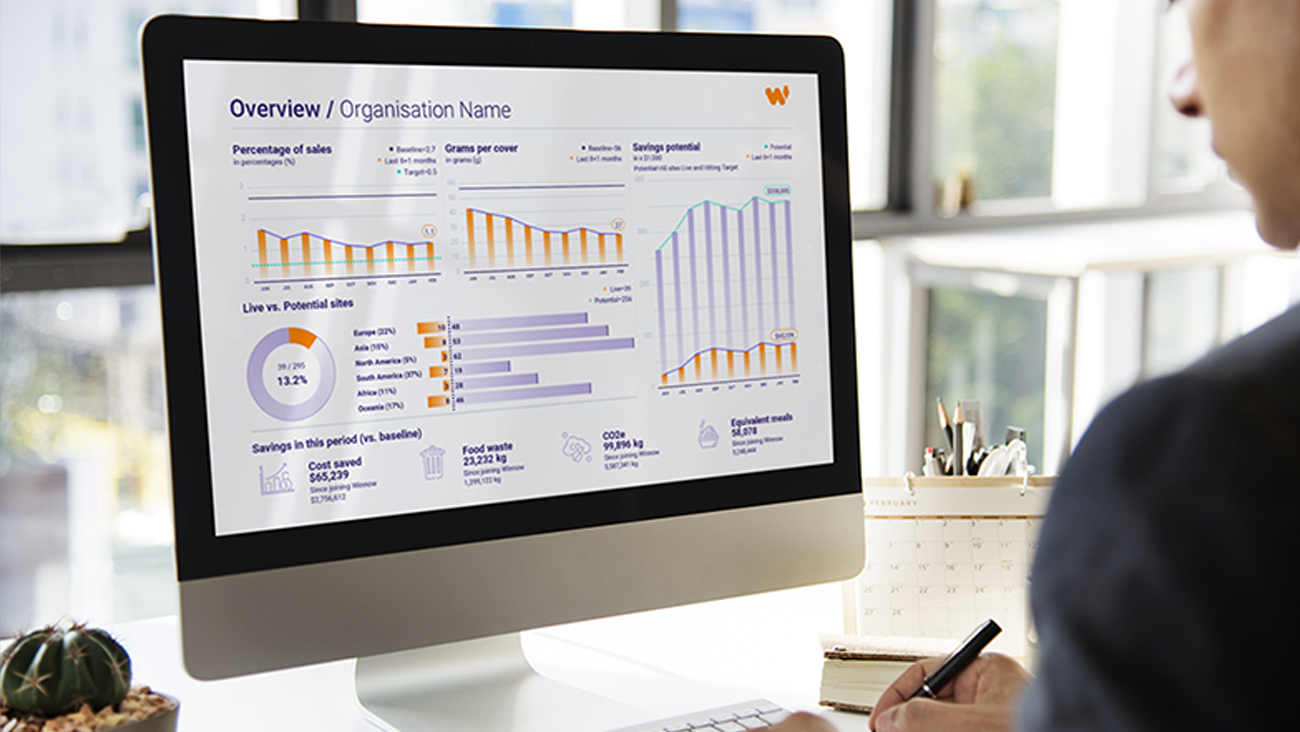Sustainability reporting and compliance are crucial aspects of operating a hospitality or food service company in today's conscientious market. Sustainability departments and food service providers are aware of the increasing importance of demonstrating their commitment to sustainability, meeting regulatory requirements, and maintaining transparency with stakeholders. In this blog post, we present Winnow's comprehensive 10-point guide to sustainability reporting and compliance for food waste management.
1. Understand the Reporting Frameworks:
Familiarize yourself with widely recognized sustainability reporting frameworks such as the Global Reporting Initiative (GRI), the Sustainability Accounting Standards Board (SASB), or the United Nations Sustainable Development Goals (UN SDGs). These frameworks provide a structured approach to sustainability reporting and help you identify the relevant indicators and metrics for your food service business.
2. Define Key Performance Indicators (KPIs):
Identify the KPIs that align with your sustainability goals and are meaningful for your food service operations. These could include metrics related to food waste reduction, greenhouse gas emissions, water usage, energy consumption, and social impact. Clear and measurable KPIs will allow you to track progress and benchmark against industry standards.
3. Implement Robust Data Collection Systems:
Invest in data collection systems that capture accurate and reliable information on sustainability metrics. Winnow's advanced food waste management technology can seamlessly integrate with your operations, providing real-time data and analytics on food waste generation, equivalent carbon emissions generated or saved, and more. Robust data collection systems are essential for accurate reporting and evidence-based decision-making.
4. Conduct Regular Audits and Assessments:
Perform regular food waste audits and assessments to evaluate your sustainability performance and identify areas for improvement. Conducting internal audits and seeking external verification or certification can enhance credibility and demonstrate your commitment to transparent reporting. Winnow provides continuous reporting on both pre-consumer and post-consumer food waste and measures against baseline periods and regular audits.
5. Set Ambitious Targets and Goals:
Establish ambitious sustainability targets and goals that align with industry best practices and the specific needs of your food service business. These targets should be time-bound, measurable, and meaningful to drive continuous improvement. Most companies committed to tackling food waste have aligned their targets with the United Nations Sustainable Development Goal 12.3 to reduce food loss and waste 50% by 2030. Several companies are taking even more ambitious measures, such as IKEA (50% by 2022) and ISS (50% by 2027).
6. Engage Stakeholders:
Engage internal and external stakeholders to gain valuable insights and foster collaboration. Involve employees, suppliers, customers, and local communities in sustainability initiatives, and communicate your progress transparently to build trust and support. It’s important to cascade information such as baseline levels of food waste, targets, and key actions needed to achieve these targets.
7. Promote Transparency in Reporting:
Transparency is crucial for sustainability reporting and is now considered a business imperative for ESG. Share your sustainability initiatives, progress, and challenges through annual sustainability reports, public platforms, and other communication channels. Transparent reporting enhances credibility, helps build a positive reputation, and attracts environmentally conscious consumers. For most companies, this reporting will increasingly become mandatory rather than just a “nice to have.”
8. Stay Abreast of Regulatory Requirements:
Keep up-to-date with evolving regulations and reporting requirements relevant to the food service industry. Familiarize yourself with local, regional, and national regulations related to sustainability, waste management, energy efficiency, and social responsibility. Compliance with these regulations is essential to avoid penalties and maintain your reputation as a responsible hospitality or food service provider.
9. Leverage Technology for Streamlined Reporting:
Artificial Intelligence (AI) is increasingly useful in data measurement, the first step to taking action on sustainability. Adopt technology solutions, such as Winnow's comprehensive reporting tools, to streamline the measurement and reporting process. These tools can automate data collection, generate reports, and provide visualizations that simplify the communication of sustainability performance and tell compelling stories. As our world becomes increasingly AI-centric, leveraging these technologies proactively can help companies to stay ahead.
10. Embrace Continuous Improvement:
Sustainability reporting is not a one-time task but an ongoing process of improvement. Regularly review your sustainability goals, monitor progress, and adapt strategies to address emerging challenges. Embrace a culture of continuous improvement and innovation to stay ahead of sustainability trends and truly inspire action from the bottom up and top down.
Sustainability reporting and compliance are essential for hospitality food service providers looking to meet stakeholder expectations, comply with regulations, and demonstrate their commitment to environmental and social responsibility. Embrace the power of data-driven insights and technological solutions like Winnow to streamline your reporting efforts and position your food service business as a leader in sustainability. Together, we can drive positive change, foster a more sustainable future, and meet the evolving demands of today's conscientious consumers.









Comment on my blog